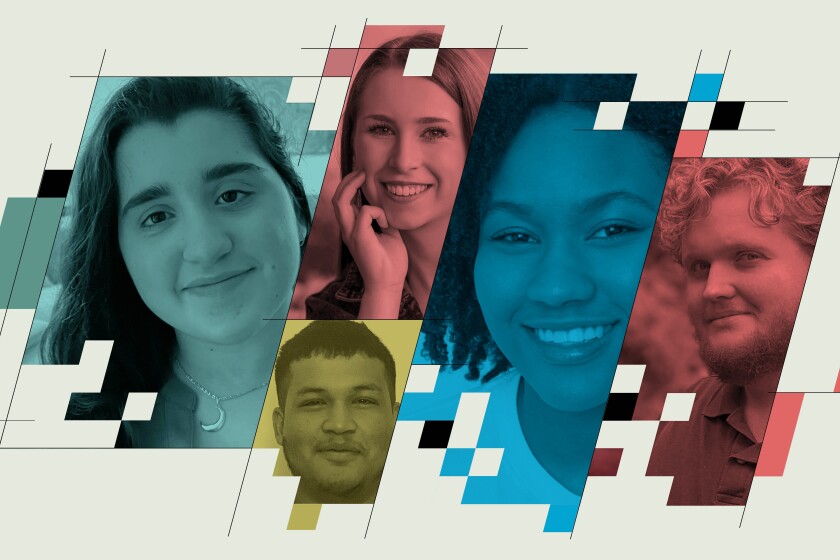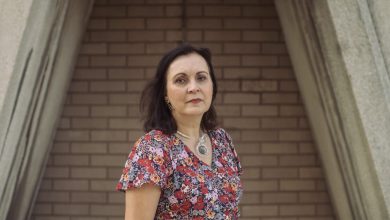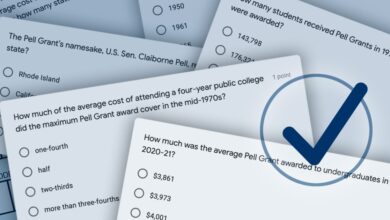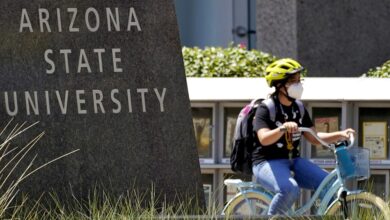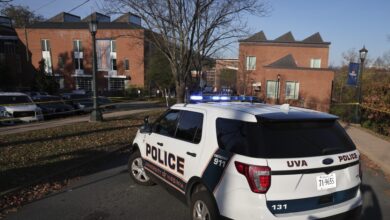The Path 2 LGBTQ Students Took to College
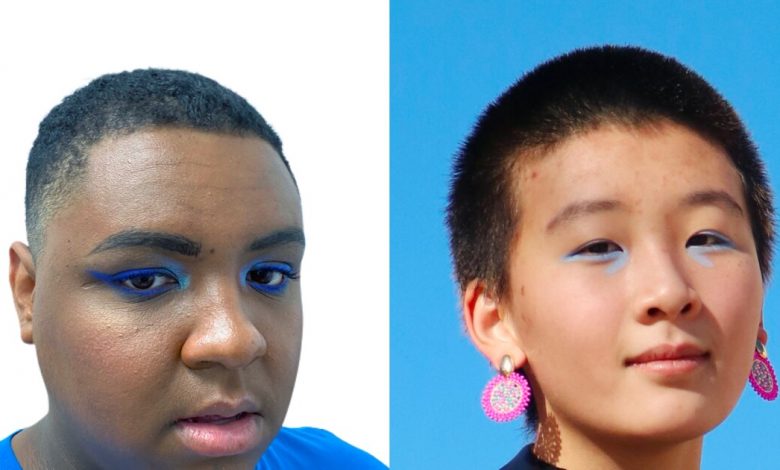
[ad_1]
Vazquez, who identifies as queer and uses the pronoun they, was raised by parents steeped in the Baptist faith. Growing up, Vazquez sometimes heard their father say that he would kick them out of the house if they turned out to be gay. When Vazquez came out, just before starting high school, their mother was supportive right away. Their father, they say, came around. Another long-distance move planted Vazquez in Albany, N.Y., where they studied hard, hoping to impress prestigious colleges.
Science stirred their imagination early on. Vazquez was 5 or 6 when they resolved to become a doctor. Then in high school they watched a video from a study suggesting that laboratory mice can pass on genetic imprints from traumatic experiences to their pups. That intrigued Vazquez, who read up on epigenetics, the study of how one’s environment and behaviors can affect the way one’s genes work. They read research on how a person’s experiences of hardship or violence can change the expression of their DNA — and pass that change on to children. They imagined studying intergenerational effects of stress and trauma on marginalized people.
Vazquez pushed in high school, taking a slew of Advanced Placement courses. They studied sex and hormone regulation in mice as an intern at Albany Medical College. They founded their high school’s first Black Student Union. And they advocated on behalf of LGBTQ students seeking to establish clubs known as genders-and-sexuality alliances in their schools.
All along Vazquez hoped to attend Harvard University. Or Cornell University. Any Ivy League campus, really. A highly selective institution seemed like an absolute must. For one thing, the wealthiest ones could give a ton of financial aid. And there was this: “I was deeply rooted in this idea of elitism. Getting into a college that everyone had heard of was the only way that people were going to see how hard I had worked.”
Vazquez applied early to the University of Pennsylvania last fall but was deferred. Dejected and unsure how to proceed, they applied to several other institutions, including Tennessee State University, in Nashville. The historically Black institution offered an accelerated program allowing select students to finish their bachelor’s degree in three years and then study medicine or dentistry at nearby Meharry Medical College, also an HBCU.
When Tennessee State offered a spot in the program and a full ride, Vazquez was floored: “I thought, ‘Oh my goodness, what?!’”
The prospect of getting a medical degree in seven years instead of eight was appealing. But Vazquez wasn’t so sure about enrolling at a college most people probably haven’t heard of. Besides, they were still hoping to get into an Ivy League institution.
Ultimately, Penn denied them; Harvard and Cornell waitlisted them. Howard University, an HBCU in Washington, D.C., admitted them but didn’t offer much financial aid. Rensselaer Polytechnic Institute offered a “half ride,” Vazquez says. And the University of Alabama at Tuscaloosa offered a substantial amount of aid, covering tuition and housing but leaving a $10,000 gap. Doable.
This spring Vazquez weighed their decision. The two best options were institutions in the South. They wanted to study in an inclusive community, a safe place in a divided nation turning increasingly violent. They considered how the rights of Black Americans and LGBTQ Americans were under attack in many red states.
Tennessee State and Alabama had much to offer. Each town had its own culture, its own vibe. But would either place really suit them?
LGBTQ applicants often consider a specific set of questions when assessing a campus. What support services does the campus offer? How inclusive is it, really? Are there gender-neutral housing options? Then they must weigh the answers against all the usual concerns, such as affordability, academic offerings, location, size, and reputation.
In many cases their search for a college is one and the same as their search for acceptance, a safe space they haven’t known before. LGBTQ students, recent research has found, are four times as likely as their non-LGBTQ peers to report choosing a college in a different city or state in hopes of finding a more welcoming climate.
Aristotle X understands. That’s not the name on their birth certificate; it’s the one they legally adopted last year after turning 18 and separating from their parents. They sought a campus where no one would mind the tattoo beneath their collarbone that says, “God Is Trans.”

Courtesy of Aristotle X
X, who identifies as queer and transgender, grew up near South Bend, Ind., in a mostly white town full of conservative Christians. Their parents were Chinese immigrants who spoke little English and often encountered racism. In elementary school, students called X’s lunch “stinky”; once they were told they couldn’t play with students who were white. Years later, a group of young men in a car followed X home and almost ran them over in the street.
When X was 11, their father moved back to China. Their mother, they say, was an evangelical Christian who was physically and verbally abusive. Each night they slept with a pink teddy bear named Blossom, which they imagined taking on a spaceship bound for other planets. X ran away from home twice, longing for the day they would live in another place.
They spent a lot of time at high school after hours. An English teacher who coached the debate team became a mentor. He encouraged their love of research and lent X books. One was The Catcher in the Rye, which resonated deeply. X often worried about what would happen when they finally left home and couldn’t look after their little sister.
During X’s sophomore year a friend encouraged them to apply to Phillips Exeter Academy, in New Hampshire. The academy offered a full scholarship, and months later they boarded an eastbound plane. “Part of me felt guilty for leaving behind my mom and sister,” X says. “But it was an opportunity to get out of a town that was slowly suffocating me.”
The next school year, X enrolled as a sophomore at Exeter. They thrived in their own way there, singing, reading poetry, and exploring their passion for scholarship. They taught a course there on transgender theory and performance studies with the help of a supportive teacher who advised the class.
They wrote a paper on trans-coding in modern horror films, exploring how movies such as Psycho pathologize transness and gender nonconformity. Their research explored a prominent trope in the films: that transness is not an internalized identity but something caused by an evil, external force, like an overbearing mother or a demon. X drew a connection between that theme and the language used to justify legislation limiting the rights of transgender people throughout the nation. “There’s this modern legislative discourse,” they say, “in which transness is an external force that’s corrupting children.”
There’s this modern legislative discourse in which transness is an external force that’s corrupting children.
X, who identifies as nonbinary, knew that they wanted to major in women’s and gender studies in college. But unlike many of their peers at Exeter, they hadn’t spent months or years planning admission strategies. One day their college counselor suggested Penn’s program, yet the design and content of the department’s web page struck X as outdated.
That influenced their decision to apply early to Columbia University. X felt drawn to New York City, calling it “the big, beating heart of queer history and theory.” They admired the scholarship of Jack Halberstam, a prominent scholar and professor at Columbia who studies queer and transgender issues.
X’s Common Application essay — “How to Be a Monster” — was adapted from a paper they wrote at Exeter. It describes the day a friend shaved X’s head at their request (“The falling hair feels like freedom from a burden you’ve been carrying forever”). X recalls what they felt when looking in the mirror, finally recognizing the person staring back, how they had “no more womanhood to hide behind,” and how they worried they were simultaneously shedding their “Asianness.”
X writes in the essay that their mother once told them that gay people were animals and that AIDS was God’s punishment. After seeing her child’s shaved head, they recall in their essay, she joked that she now had another son in the family: “Deeper down, you are afraid that your mother … sees only a monster.”
The moment helped convince X that their mother would reject them if they ever came out to her. During their senior year, they went back to Indiana one more time before legally separating from their parents. At home they stuffed as many belongings as they could into a suitcase. They felt devastated after deciding that there just wasn’t enough room for Blossom, the pink teddy bear.
Columbia accepted X. The university granted them a dependency override and offered them a financial-aid package covering almost the entire cost of attendance. A scholarship from the Point Foundation, which supports LGBTQ students, covered the gap.
When X visited Columbia, in April, they were struck by the diversity of students, the wide range of clothing styles. Chats with strangers felt like chats with friends. X met several queer students of color on the campus and connected online with others who would be matriculating this summer. They were thrilled to find an Asian grocery store down the street from the dorm where they stayed. They bought a bottle of aloe-vera juice there and savored a taste from childhood. They left New York knowing it was the right place.
In July X was staying with a friend in the Hamptons, on Long Island, sleeping on a pullout bed in a room that they share. Since cutting ties with their family, they had relied on a network of queer people to find places around the country to crash during school breaks. Their hosts’ hospitality buoyed them, but couch-surfing often felt lonely.
X had been working at a farmstand and spending time at the beach. As they thought about moving into a dorm at Columbia, they felt a mix of relief and anxiety. Yes, they soon would have a room they could call their own, a place to put their belongings. But a dorm, with rules and resident assistants, wasn’t a place where one could exist unconditionally. X couldn’t quite call it home. “It’s bittersweet,” they say. “This is the closest thing I can get to a home for a long time.”
Vazquez worried that what they called their own “internalized anti-Blackness” had convinced them that an HBCU didn’t measure up. Most of their friends were headed to Ivies and other top-20 colleges, all with higher retention rates than Tennessee State’s. Vazquez wondered if that would be a problem. Would attending a public HBCU in the South mean that they weren’t as smart and accomplished as students attending private colleges in the Northeast?
No, Vazquez ultimately decided. They believed in the cultural importance of HBCUs and understood their challenges, especially how underfunding had long hindered them.
But Vazquez worried that Tennessee State, which they call socially conservative, wouldn’t be the most comfortable campus for a queer student. They scrolled through Twitter to get a better feel for the LGBTQ community there. They reached out to one of its members, who connected them with other students and told them about the Genders and Sexualities Alliance at TSU. After asking students various questions about campus life and the seven-year medical program, Vazquez felt reassured.
Still, Alabama was appealing. Its research facilities were impressive, for one thing. And it seemed like a more inclusive campus than Tennessee State, with more offerings for LGBTQ students.
I am putting myself into a very real marginalized situation. These are dark times. Voldemort is here. It’s a lot.
But in the end, Vazquez chose TSU. They concluded that Nashville was a more vibrant and inclusive city than Tuscaloosa was, and its large, active queer community appealed to them. And, yes, Vazquez, raised on 1990s R&B, felt drawn to Nashville’s legendary music scene.
In the months after committing, Vazquez, who, like X, is a Point Foundation Scholar, felt anxious about moving to Tennessee. After the Supreme Court struck down Roe v. Wade, in June, a near-total ban on abortions took effect in the state. Since 2021, Tennessee legislators have introduced more than a dozen bills restricting the rights of transgender youth. Gov. Bill Lee, a Republican, signed legislation this spring barring trans women from competing in college sports. “I am putting myself into a very real marginalized situation,” Vazquez says. “These are dark times. Voldemort is here. It’s a lot.”
While chatting with another incoming student, Vazquez learned that TSU’s new dorms don’t have gender-neutral bathrooms. “It was a little bit of a shock to me,” Vazquez says, “like, oh dang, how’s this going to work?”
At the same time, uncertainty felt like a call to action. Maybe, Vazquez thought, they would start a push for gender-neutral bathrooms in dorms. They liked the idea of advocating for the needs of marginalized people in a red state where those needs were especially urgent. “It kind of inspires me,” Vazquez says, “to get on campus and try to jump-start things a little bit so we can increase retention rates for Black LGBTQ students, who often have very little support from their families.”
In July, Vazquez was sleeping a lot and playing Pokémon Legends: Arceus on their Nintendo Switch. But sometimes they ventured out into the sun. Tennessee State had sent them just the thing: a visor, blue with white lettering. These days they wore it pretty much everywhere they went.
[ad_2]
Source link


